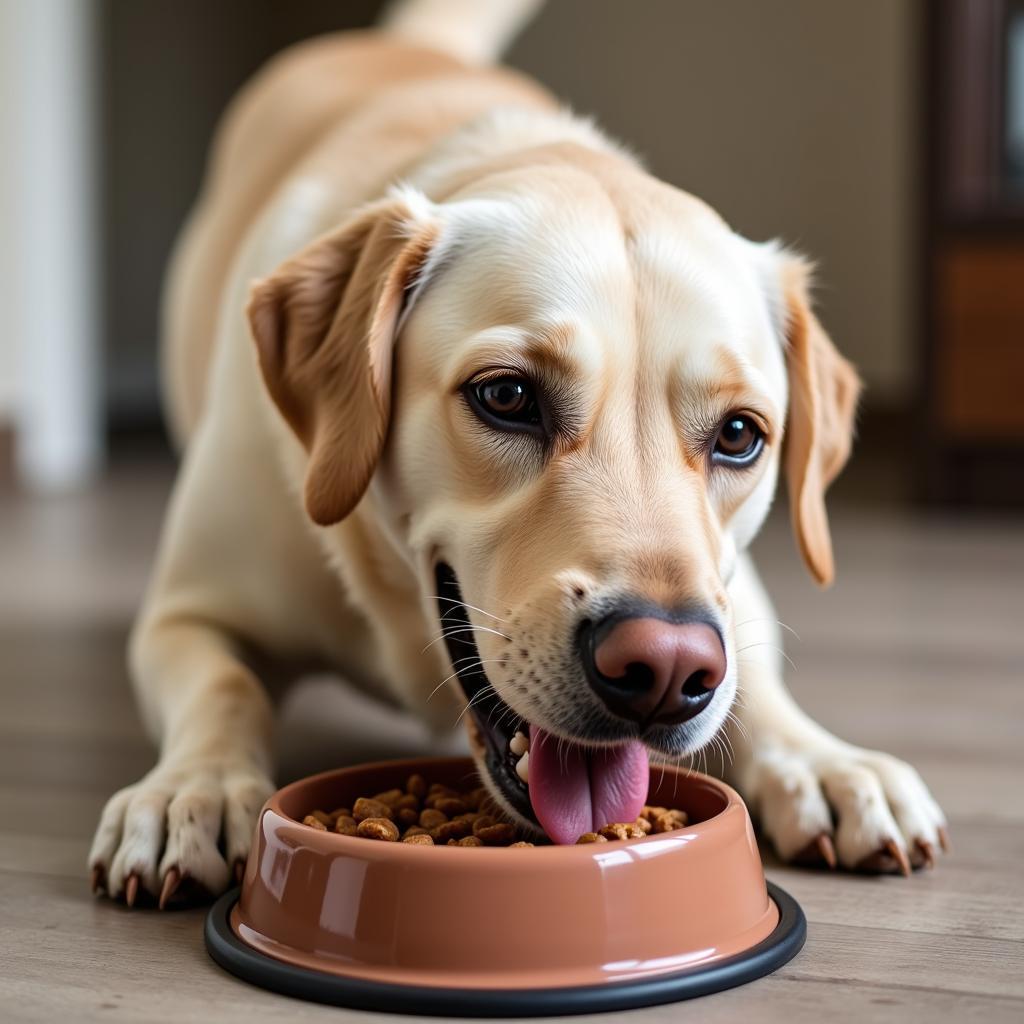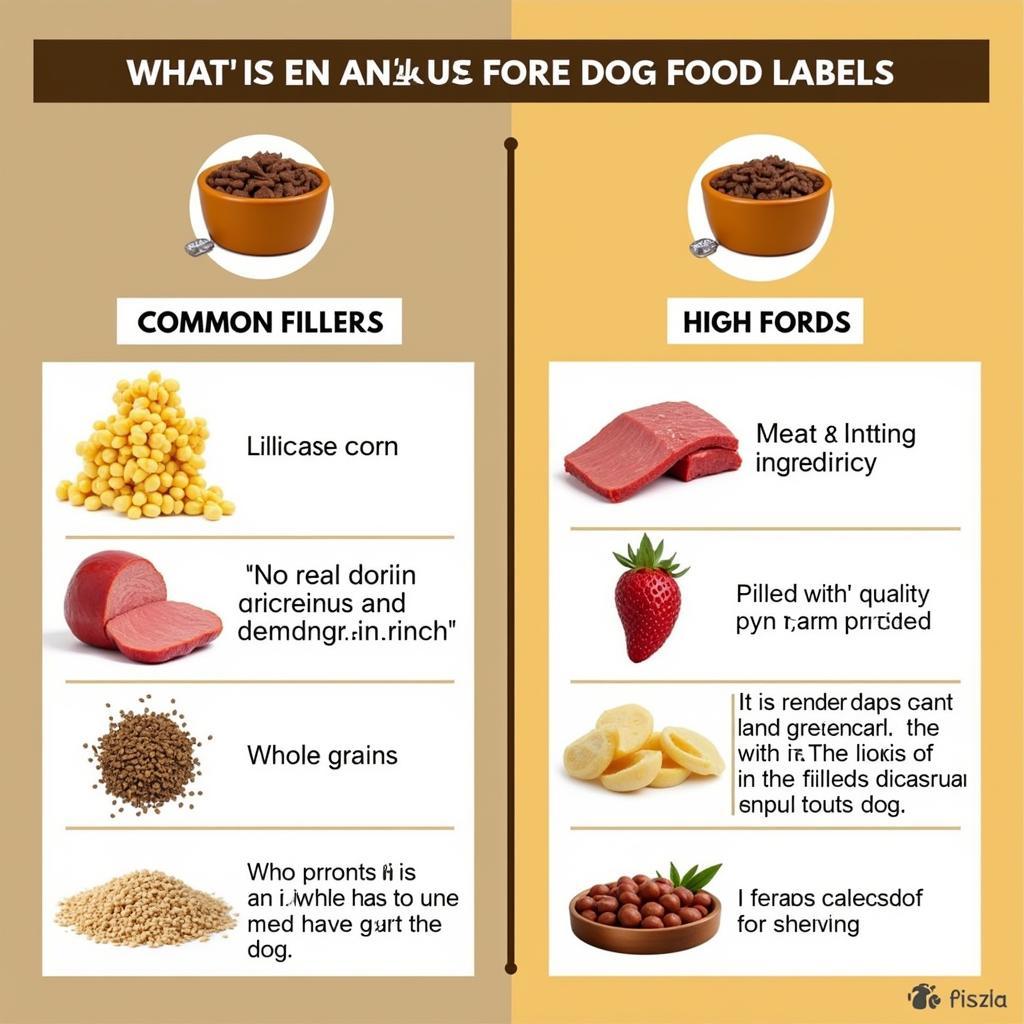Choosing the Best Dog Food For Senior Labradors is crucial for ensuring your furry friend enjoys a happy and healthy life well into their golden years. As your Labrador ages, their nutritional needs change, and finding a diet that addresses these needs can make all the difference.
 Senior Labrador Retriever Enjoying a Meal
Senior Labrador Retriever Enjoying a Meal
Understanding the Nutritional Needs of Senior Labradors
Just like humans, dogs experience age-related changes that impact their overall health and well-being. Senior Labradors, typically those over seven years old, require specific nutrients to support their aging joints, maintain a healthy weight, and promote cognitive function.
Here are some key nutritional considerations for senior Labs:
- Reduced Calories: Senior dogs are generally less active, leading to weight gain if their diet isn’t adjusted. Look for dog foods with lower calorie counts and fat content.
- Increased Fiber: Higher fiber content aids in digestion and can help regulate your dog’s weight.
- Joint Support: Glucosamine and chondroitin are essential for maintaining healthy joints and cartilage, crucial for breeds like Labradors prone to hip and elbow dysplasia.
- Brain Health: Antioxidants like Vitamin E and Omega-3 fatty acids can support cognitive function and help combat age-related decline.
Key Ingredients to Look for in Senior Labrador Food
Choosing the right food for your senior Labrador means scrutinizing ingredient lists. Here’s what to keep an eye out for:
- High-Quality Protein: Look for dog foods with real meat or fish as the first ingredient, providing essential amino acids for muscle maintenance.
- Healthy Fats: While you want to avoid excess fat, healthy fats like those found in fish oil are crucial for skin and coat health and can benefit cognitive function.
- Complex Carbohydrates: Opt for whole grains like brown rice and oatmeal, which offer sustained energy and are easier to digest than refined grains.
- Limited Fillers: Avoid dog foods with excessive fillers like corn, wheat, and soy, which offer little nutritional value.
 Comparing Dog Food Ingredients for Senior Dogs
Comparing Dog Food Ingredients for Senior Dogs
Choosing the Best Dog Food for Your Senior Labrador
Every dog is different, and the best dog food for your senior Labrador will depend on their individual needs and preferences. Consider these factors:
- Activity Level: A less active senior Labrador will require fewer calories than a more active counterpart.
- Current Health Conditions: Consult with your veterinarian to address specific dietary needs related to any existing health issues.
- Food Allergies or Sensitivities: Just like humans, dogs can develop allergies as they age. Observe your dog for any signs of sensitivities and adjust their diet accordingly.
Making the Transition to Senior Dog Food
When switching your Labrador to senior dog food, it’s essential to do so gradually to avoid digestive upset. Mix increasing amounts of the new food with their current food over 7-10 days until they are fully transitioned.
Tips for Feeding Your Senior Labrador
- Smaller, More Frequent Meals: Instead of one or two large meals, feed your senior Labrador smaller meals throughout the day to aid digestion and maintain energy levels.
- Hydration is Key: Always ensure fresh water is available, especially for senior dogs who may be more prone to dehydration.
- Monitor Your Dog’s Weight: Regular weigh-ins can help you adjust food portions to maintain a healthy weight for your senior Labrador.
Frequently Asked Questions About Dog Food for Senior Labradors
Q: When should I switch my Labrador to senior dog food?
A: Most Labradors are considered senior dogs around seven years old. However, it’s best to consult with your veterinarian for personalized advice.
Q: Can I continue feeding my senior Labrador their regular adult dog food?
A: Adult dog food is not formulated to meet the specific nutritional needs of senior dogs. Switching to a senior formula is recommended.
Q: What are some signs that my senior Labrador’s food is not agreeing with them?
A: Look out for changes in appetite, weight, stool consistency, skin or coat health, or any digestive issues.
Q: Are grain-free diets suitable for senior Labradors?
A: Not necessarily. While some dogs thrive on grain-free diets, others may not. Discuss the best option for your Labrador with your veterinarian.
Q: Can I give my senior Labrador human food?
A: While some human foods are safe for dogs, many are toxic. Stick to dog food formulated for their needs.
Q: How can I encourage my senior Labrador to eat if they’ve lost their appetite?
A: Try warming up their food, adding a little low-sodium broth, or hand-feeding them. If the issue persists, consult your vet.
Need More Help?
If you’re unsure about the best dog food for your senior Labrador or have any concerns about their diet, don’t hesitate to reach out to our team of experts at Mina Cones Food. Call us at 02437655121, email us at minacones@gmail.com, or visit us at 3PGH+8R9, ĐT70A, thôn Trung, Bắc Từ Liêm, Hà Nội, Việt Nam. We’re available 24/7 to assist you.